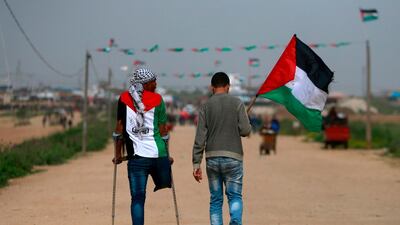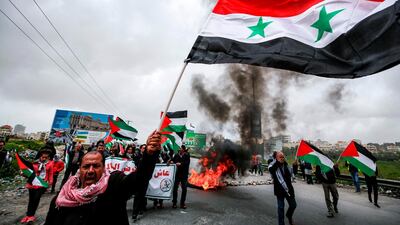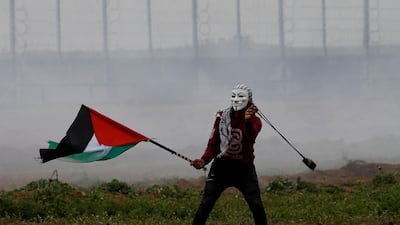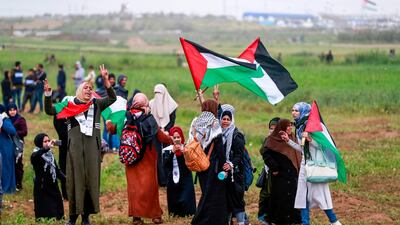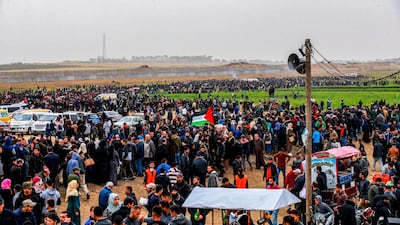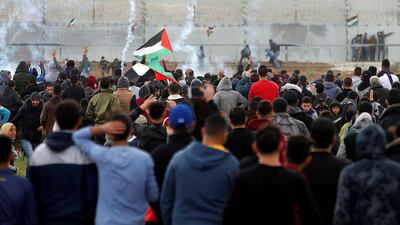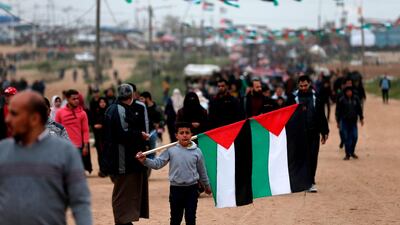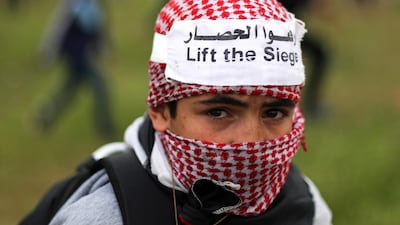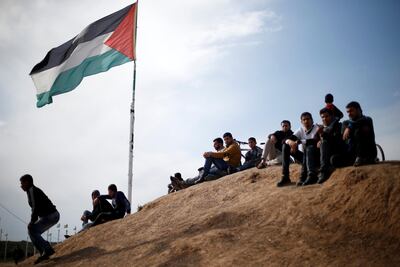Four Palestinians were killed on Saturday as thousands gathered at the Gaza border to mark a year of protests against the Israeli blockade that has crippled the strip.
The at least weekly "Great March of Return" protests over the last 12 months have been met by Israeli teargas, sound grenades and live fire. On last count 9,204 have been shot, hit by shrapnel or tear-gas canisters according to the UN and over 200 killed – at least 50 were children. One Israeli soldier has been killed.
On Saturday, a 17-year old boy died instantly when he was shot in the face by Israeli snipers near the border fence close to Gaza City. Tamer Abu Al Kheir, 17, died after being shot in the chest earlier in the day. The third casualty, 21-year old Mohammed Saad, came hours ahead of the main protest in the early hours of Saturday morning. At least 46 Palestinians were wounded in the firing.
Protest organisers said the marches would continue into their second year.
UN officials on Friday called for restraint from both sides to prevent further deaths.
However, there was no repeat of the bloodshed in which 60 Palestinians were killed in a single day on May 14, 2018, when the United States marked the opening of their embassy in Jerusalem after recognising the holy city as the capital of Israel.
Egypt brokered talks between Israel and Gaza's ruling Hamas to try and keep the anniversary largely peaceful.
Hamas said on Friday that an understanding had been reached that would see Israel ease its crippling blockade of Gaza in exchange for protests remaining calm. Israel is yet to officially comment.
At least 40,000 of the strip's estimated 2 million residents gathered at five points along the border to hold protests. Young men threw rocks across the fence towards Israeli soldiers who responded with teargas. An Egyptian security delegation visited the protest site east of Gaza city and Hamas leaders Ismail Haniya Sinwar also turned out.
Protesters held up pictures of those killed by Israel at protests over the last year and others held up signs demanding an end to blockade of the territory.
The demonstrators are calling for Palestinians to be allowed to return to land their families fled or were expelled from during the 1948 war that accompanied Israel's creation.
Israel claims any such mass return would spell the end of a Jewish state and that its actions have been necessary to defend the border.
Last month, a UN investigation said Israeli soldiers had intentionally fired on civilians in what could constitute war crimes.
Mohammed Baian, 75, who has taken part in the marches since last year, came with his wife and holding a sign that read: "Our marches will continue until [the] breaking the siege of Gaza".
"These protests expose the real face of Israeli occupation to the world, and show the crimes that they commit against our unarmed protesters," he told The National.
But Mr Baian said that, ultimately, the siege of Gaza would only be lifted when Palestinian parties are again united.
"The march didn't succeed in breaking the siege of Gaza because that will only happen if the Palestinian parties come together and end the political divisions."
Hamas drove Palestinian President Mahmood Abbas’s Fatah party from the enclave after winning an election in 2006. The parties have been bitterly divided since and efforts to reconcile differences were derailed last year when Palestinian Prime Minister Rami Hamdallah was targeted in a bombing while he visited the strip to help mediate a rapprochement.
Ibrahem Sada, 27, leaned on a crutch as he watched the protests from about a kilometre away in the Malaka area. He was shot in the leg by an Israeli sniper while taking part in the protests four months earlier. He is among the thousands of other Gazans targeted in the legs and arms by Israeli sharpshooters.
"Unfortunately, these protests didn't succeed in lifting the siege of Gaza – we keep receiving promises but without any results," he told The National. "But they succeeded in bringing the Palestinian cause back before the world and putting a light again on Gaza's problems."
As well as limits on the movement of people, barring Gazan fishermen going out to sea more than a few kilometres, it also limits the amount of electricity and basic goods entering the enclave.
Mr Sada's grandfather left his native village of Harbia, about 15 kilometres outside Gaza's present borders, when Israel was formed in 1948.
"Our participation in these protests can help to break the siege and give us a dignified life like other people around the world," he said.
With talks reportedly being finalised, there is hope of a change in the situation in the enclave that has been left broken by three devastating wars with Israel in the last decade.
Khalil Al Hayya, a senior Hamas figure, said they had received "positive signs" from the Egyptians and were expecting to receive a timetable from Israel on Sunday. But, he warned, "we will continue our marches until all our goals are achieved."
Deputy Hamas leader Salah Alaruri and Secretary General of the Islamic Jihad – a militia that operates in Gaza and regularly engages in tit-for-tat fire with Israel – met in Beirut on Saturday to discuss the deal proposed by Egypt.
The pair warned ahead of the march that any Israeli violence would be met with an equal response.
Israeli military spokesman Ronen Manelis said on Saturday evening that the relative calm at the protests was due to “unprecedented restraint” from Hamas.
Party officials in highly visible jackets spread along the border fence to prevent crowds rushing the barrier.
Israeli officials also said that they were satisfied with the Egyptian mediation efforts.
However, hard-line Israeli politicians Naftali Bennett and Ayelet Shaked on Saturday both vowed to block any deal with Hamas and that the latter's leaders joining the march had left Israeli "humiliated".
While it is unclear what they could do to prevent the deal, domestic opposition headed of a crucial election on April 9 could cause headaches for Prime Minister Benjamin Netanyahu.
While he has talked tough on Hamas, Mr Netanyahu is widely seen as wanting to avoid a large scale invasion of Gaza but he faces accusations from Israeli hawks of being soft on the group.
The anniversary of the protest movement's start also comes at a crucial moment for Hamas who has been facing demonstrations against hiked prices, taxes and general conditions. The movement clamped down on the protests quickly, arresting hundreds, beating those gathered and attacking human rights activists and journalists. Within a week the movement had largely fizzled out.
The anniversary came just days after a significant flare-up of violence between Israel and Hamas sparked by a rare long-range rocket strike from the enclave on Tel Aviv.
The incident led to days of heavy airstrikes and more rocket fire out of the strip until Egypt negotiated a de-escalation. The whole incident, Israeli military officials reportedly believe, was sparked by an accidental launch of Hamas’ long-range projectiles.
